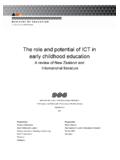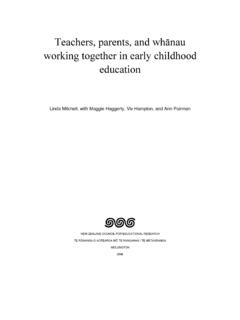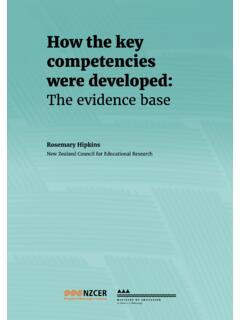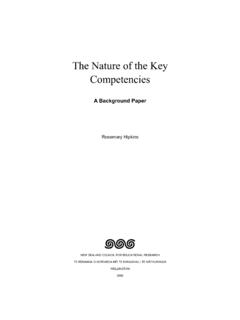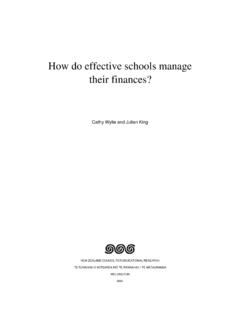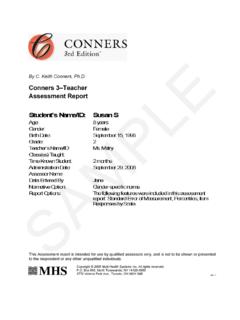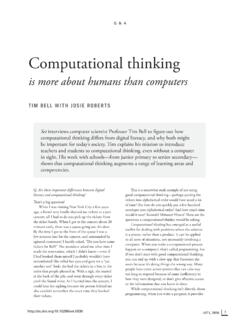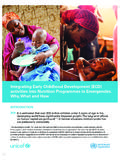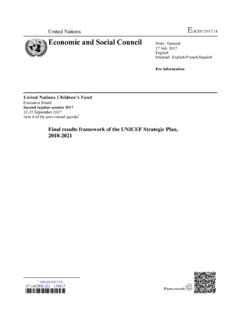Transcription of Teachers, parents and whnau working together in …
1 Teachers, parents , and wh nau working together in early childhood education Linda Mitchell, with Maggie Haggerty, Viv Hampton, and Ann Pairman NEW ZEALAND COUNCIL FOR EDUCATIONAL RESEARCH. TE R NANGA O AOTEAROA M TE RANGAHAU I TE M TAURANGA. WELLINGTON. 2006. New Zealand Council for Educational Research P O Box 3237. Wellington New Zealand NZCER, 2006. ISBN 1 877293 55 5. Distributed by NZCER Distribution Services P O Box 3237. Wellington New Zealand NZCER. Acknowledgements Teachers in this study who participated in the research and professional development project, and shared their experiences and thinking with us were: Raylene Becker, Sue Britton, Christine Canagasabey, Bob Drummond, Ripeka Ellison, Mary Hailes, Karmen Hayes, Christine Hazelhurst, Wendy Hemi, Amanda Higgins, Glenys Knowler, Sue Lake, Colleen McCaul, Mary McDonald, Mary McGirr, Claire McMullin, Raylene Muller, Debbie Newton, Amanda Olsen-Osberg, Terry Rogers, Rachael Slin, Sue Smith, Moira Stewart, Sandie Wairau, Wendy Walker, Olivia Worboys, and Jo Wylie.
2 We appreciated their willingness to undertake action research, to critically examine feedback from parents and wh nau, to contribute their views, and to be open about successful and less successful experiences. We thank the parents who worked with teachers in their centres to develop relationships in the interests of children, and the willingness of those parents who were interviewed to talk about their views and experiences. We thank NZCER staff who contributed to this research. Cathy Wylie provided advice and guidance throughout the project. Kristina Louis and Susan Tompkinson provided library support, and Anne Else edited the report. i NZCER. ii NZCER. Table of Contents Acknowledgements i Executive summary vii 1. Introduction 1. 2. The study in context 3. Why work with parents /wh nau? 3. Approaches to working with parents /wh nau 4.
3 Sharing pedagogical aims and practices 5. Supporting parents and wh nau to undertake educational activities at home 7. parents as educators within early childhood education settings 8. Issues 9. Principles of effective working relationships 10. 3. Methodology 11. teacher participants 11. The participating early childhood education centres 11. Professional development and action research 12. Data collection and analysis 14. 4. Communicating about children's learning 17. Connecting home and cr che 17. parents ' aspirations and views about the cr che 18. Views of communication, relationships, and involvement 19. Closer connection between home and cr che 19. How parents and staff worked to build closer connections 21. Views of outcomes 22. Views of professional development 24. Conclusion 25. Two-way communication about children's learning 26.
4 parents ' aspirations and views about the centre 27. Views of communications, relationships, and involvement 28. Communicating with parents about children's learning 29. Views of outcomes 31. Views of professional development 34. iii NZCER. Conclusion 35. Creating a community of learners 35. parents ' aspirations and views about the centre 37. Views of communication and relationships 38. Collaborating in the interests of children 39. Videoing children and adults at the centre 41. Including parents in assessment, planning, and curriculum discussions 43. The outdoor environment plan 43. Views of outcomes 44. Views of professional development 48. Conclusion 50. 5. Parent and wh nau participation in the education programme 51. working with culturally diverse families 51. parents ' aspirations and views about the kindergarten 52. Views of communication and relationships 56.
5 Expanding knowledge and support for cultural diversity 57. Holding a shared lunch and parent meeting 58. The kindergarten's diverse cultures reflected in the kindergarten 59. Views of outcomes 61. Views of professional development 64. Conclusion 65. Using videotape to analyse pedagogy and communicate with parents 65. parents ' aspirations for children's education 66. Views of communication and relationships 66. Developing a sense of community 68. Views of outcomes 70. Views of professional development 72. Conclusion 73. Involving fathers in the life of the kindergarten 74. Aspirations for children and views about the kindergarten 75. Views of communication and relationships 76. Analysing the current situation and making plans 78. A fathers' and other significant adults' evening 80. Making environmental changes 81. A fathers' support group 82.
6 Views of outcomes 83. Views of professional development 86. Conclusion 86. 6. Conclusion 89. Respect and belonging a basis for partnership 89. Integrating action and sharing knowledge between home and ECE centre 90. Strategies teachers found helpful in finding out parent views 90. Discussing values and aspirations 90. iv NZCER. Surveying parents /wh nau 91. Parent social occasions and meetings 91. Relationship focused on pedagogy and children 92. parents contributing to assessment, planning, and evaluation 92. Explaining the curriculum and environment 93. Involving parents in the education programme 93. Dealing with the hard issues 94. parents ' desire for tests and literacy teaching 94. working with parents of multicultural backgrounds 94. Professional development processes 95. References 97. Tables Table 1 Profile of the six early childhood education centres 12.
7 Table 2 Staffing profiles and focuses of work with parents and wh nau 13. Table 3 Summary of interview themes (April/May 2002) 15. Table 4 Interview participants in 2002 and 2003 18. Table 5 Parent and staff views of outcomes 23. Table 6 Views of parents and wh nau (n=6) 24. Table 7 Interview participants in 2002 and 2003 27. Table 8 Parent and staff views of outcomes 33. Table 9 Views of parents and wh nau (other than those interviewed previously) (n=8) 34. Table 10 Interview participants in 2002 and 2003 36. Table 11 Parent and staff views of outcomes 45. Table 12 Views of parents and wh nau of teacher /parent communications (n=8) 47. Table 13 Interview participants in 2002 and 2003 52. Table 14 Parent and staff views of outcomes: Multicultural kindergarten 61. Table 15 Views of parents and wh nau of teacher /parent communications (n=13) 63.
8 Table 16 Interview participants in 2002 and 2003 66. Table 17 Parent and staff views of outcomes 69. Table 18 Views of parents and wh nau of teacher /parent communications (n=8) 72. Table 19 Interview participants in 2002 and 2003 75. Table 20 Parent and staff views of outcomes 84. Table 21 Views of parents and wh nau of teacher /parent communications (n=9) 86. v NZCER. Appendices Appendix A: Phase One interview schedules 101. Appendix B: Phase Two interview schedules 109. vi NZCER. Executive summary There are few reported studies of how teachers in New Zealand early childhood education centres can strengthen their approaches to working in partnership with parents and wh nau, or how parent/wh nau involvement is perceived by each party. The research reported here is of a one-year research and professional development project aimed at supporting ways in which teachers and parents /wh nau worked together to enhance children's learning and wellbeing.
9 The research involved case studies in three education and care centres and three kindergartens whose teachers wanted to be part of the project. The research explored the professional development processes, the perceptions of teachers and parents /wh nau of parent/wh nau involvement and the processes of change over the course of the year, and factors that helped or hindered teacher and parent/wh nau partnerships. The case study approach was valuable in allowing exploration, in some depth and over time, of different possibilities for building relationships between teachers and parents /wh nau, and consideration of framing factors within six very different early childhood education contexts. The research was undertaken in education and care centres and kindergartens, rather than parent/wh nau-led services, to see what is possible in settings where parents /wh nau are not the main educators.
10 A parallel research and professional development project was undertaken by Glenda MacNaughton, University of Melbourne. The research project unfolded differently in each country, and a combined analysis was not made. However, the New Zealand and Australian researchers, Linda Mitchell and Glenda MacNaughton, made a joint presentation to the Eighth early childhood Convention, Palmerston North, 22 25 September 2003. The New Zealand presentation is reported in Mitchell (2003). The Australian presentation is reported in MacNaughton (2004). Teachers from five of the six centres also presented a workshop at the convention. The three professional development advisers, Maggie Haggerty and Viv Hampton of the then Wellington College of Education (now Victoria University of Wellington College of Education), and Ann Pairman, from the early childhood Development (ECD now part of the Ministry of Education), worked with between one and three of the selected centres.
